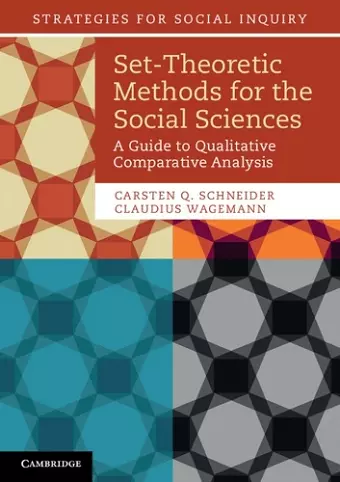Set-Theoretic Methods for the Social Sciences
A Guide to Qualitative Comparative Analysis
Carsten Q Schneider author Claudius Wagemann author
Format:Paperback
Publisher:Cambridge University Press
Published:30th Aug '12
Currently unavailable, and unfortunately no date known when it will be back
This paperback is available in another edition too:
- Hardback£87.99(9781107013520)

A 'user's guide' to Qualitative Comparative Analysis (QCA) and the methodological family of set-theoretic methods in social science.
A comprehensive guide to Qualitative Comparative Analysis (QCA). Helpful for beginners and insightful for advanced users, this book will appeal to those who want to know what QCA is and how it functions and to those who are planning to apply QCA in their research.Qualitative Comparative Analysis (QCA) and other set-theoretic methods distinguish themselves from other approaches to the study of social phenomena by using sets and the search for set relations. In virtually all social science fields, statements about social phenomena can be framed in terms of set relations, and using set-theoretic methods to investigate these statements is therefore highly valuable. This book guides readers through the basic principles of set theory and then on to the applied practices of QCA. It provides a thorough understanding of basic and advanced issues in set-theoretic methods together with tricks of the trade, software handling and exercises. Most arguments are introduced using examples from existing research. The use of QCA is increasing rapidly and the application of set-theory is both fruitful and still widely misunderstood in current empirical comparative social research. This book provides the comprehensive guide to these methods for researchers across the social sciences.
'We have long needed a volume that comprehensively, clearly, and systematically covers Boolean and fuzzy set methodologies. Schneider and Wagemann have filled this need with their book, and it will certainly play a central role in guiding research and teaching.' Gary Goertz, University of Arizona
'For relationships that can be viewed in terms of sufficiency or necessity, set-theory provides a powerful tool to model causality. QCA, in its various forms, provides a bridge between single case studies and quantitative analysis of linkages among interval-level or ratio variables across multiple cases by providing the tools to examine relationships in set-theoretic terms among dichotomies or concepts defined as fuzzy sets. This clearly written and comprehensive introduction to QCA, which insists on causal analyses that are explicitly intended to study possible multiple pathways to given outcomes, is must-reading for social scientists who wish to expand their methodological horizons and get away from the all too common 'throw as many variables as possible into the regression hopper and see which ones come up statistically significant' form of barefoot empiricism.' Bernie Grofman, University of California, Irvine
'This is the first volume that bridges the fundamentals of set-theoretic methods with the many ongoing innovations. A must for anyone aiming to exploit the full potential of the QCA toolbox.' Benoît Rihoux, Université catholique de Louvain, Belgium, and COMPASSS international network
ISBN: 9781107601130
Dimensions: 244mm x 173mm x 18mm
Weight: 700g
370 pages